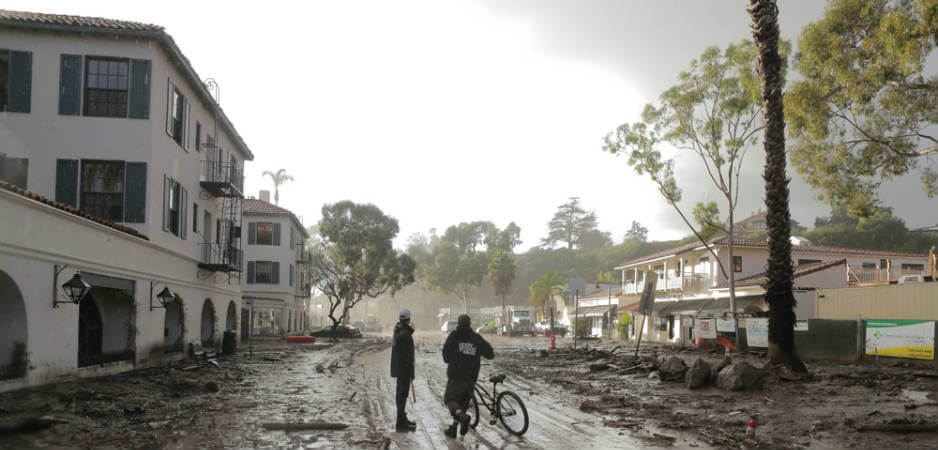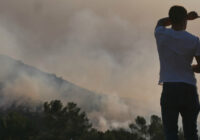You can now add landslides to the list of America’s climate change concerns.
This last year California had two of the most devastating fires in its history, with a firestorm that burned 245,000 acres and killed 44 people. The cost to the economy was over $85 million. Just seven weeks later, the wildfires in the southern part of the state burned 307,900 acres and over 250,000 people were forced to evacuate. In 2016, Colorado, another fire prone state, saw 1,190 wildfires, burning nearly 130,000 acres in total.
California, Colorado and much of the western United States are used to droughts, and we understand that they lead to wildfires. But now we need to add landslides to the list of natural disasters we must prepare for. In fact, according the US Geological Survey, disastrous slides can occur in all 50 states, with regions like the Appalachian Mountains, the Rocky Mountains and the Pacific Coastal Ranges particularly vulnerable to landslides. Is it time to pay more attention to climate change?
The warmest five years on record have occurred since 2006, with 2017 being one of the warmest yet. This triggers four phenomena: drought, wildfires, more intense rainstorms and, finally, landslides. We know that warming temperatures can lead to drought, but drought in itself is part of a cyclical effect: Under warmer conditions, more precipitation falls as rain than snow. This means that less water is stored as snow in the winter months, leading to a shortage of accessible water in the long term (or drought), and more flooding in the short term.
Drought causes a massive die-off of trees, as seen throughout the western US. Experts estimate that there are over 100 million dead trees as a direct result of the drought. With parched landscapes, especially in forest areas, wildfires are also more frequent and far more intense. Fires in the west have been hotter and more massive in scale than ever before, and vast tracts of land have been denuded by fire.
Warmer oceans lead to more evaporation, sending more water into the atmosphere. The warmer atmosphere, in turn, has the capacity to hold onto more of this moisture, which then comes back down in the form of heavier rainfall. These rainstorms are therefore more intense, causing groundwater levels to rise and increasing the likelihood of landslides.
When you combine more intense rainstorms and barren landscapes caused by fire, you get landslides. This is no longer conjecture. A 2014 slide in Oso, Washington state, killed 43 people, the deadliest in US history, and the December 2017 landslide in Montecito, California, killed 41. Up to 15 feet in height and moving as quickly at 20 mph, these landslides create a specter of what we need to plan for in any of our mountainous regions.
Being awakened in the middle of the night to emergency sirens warning of an impending landslide used to be something that only a few homeowners perched on the side of steep slopes worried about. But as the devastating slides of late 2017 have shown us, that threat is now present in many more places, thanks in no small part to climate change. You don’t have to be a climate scientist, or a rocket scientist, to see that our climate is changing. So, what should we do?
Three things. First, we need to send a message to D.C. that tackling climate change must be a priority. Second, we need to send a message to the rest of the world that states like Washington, Oregon and California will continue to be global leaders in reducing our carbon footprint even after the White House declared that the US is withdrawing from the Paris Climate Accord.
And, finally, we need to continue to encourage a culture that fosters innovative companies like Tesla, Sunpower and AirBnB, whose mission is to contribute to a decreased global carbon footprint. We may not be able to control the powers of nature, but every state can do its part to tackle these challenges head on.
The views expressed in this article are the author’s own and do not necessarily reflect Fair Observer’s editorial policy.
Photo Credit: Media Bakery13 / Shutterstock.com
Support Fair Observer
We rely on your support for our independence, diversity and quality.
For more than 10 years, Fair Observer has been free, fair and independent. No billionaire owns us, no advertisers control us. We are a reader-supported nonprofit. Unlike many other publications, we keep our content free for readers regardless of where they live or whether they can afford to pay. We have no paywalls and no ads.
In the post-truth era of fake news, echo chambers and filter bubbles, we publish a plurality of perspectives from around the world. Anyone can publish with us, but everyone goes through a rigorous editorial process. So, you get fact-checked, well-reasoned content instead of noise.
We publish 2,500+ voices from 90+ countries. We also conduct education and training programs
on subjects ranging from digital media and journalism to writing and critical thinking. This
doesn’t come cheap. Servers, editors, trainers and web developers cost
money.
Please consider supporting us on a regular basis as a recurring donor or a
sustaining member.
Will you support FO’s journalism?
We rely on your support for our independence, diversity and quality.






